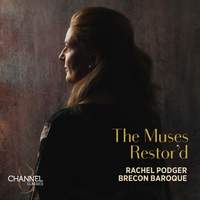Recording of the Week,
Rachel Podger and Brecon Baroque: The Muses Restor’d
Rachel Podger and Brecon Baroque’s new album restores to their rightful place some of the key composers of a period often overlooked in British musical history. Between the Tudor giants and Henry Purcell lies an era that is often overlooked, and it’s this period that Podger and her musicians are keen to champion.
There’s ample reason to be drawn to the time of John Jenkins, William Lawes and Matthew Locke - the English consort tradition in the late seventeenth and early eighteenth centuries was unrivalled anywhere else in Europe, and these composers were at the height of their powers. The Muses Restor’d presents a selection of their works, as well as others by less familiar contemporaries - while also peeking ahead to an impending shift in musical tastes, with works by Baroque composers both extremely well-known and virtually unheard-of.
Podger waxes lyrical on the convivial, conversational atmosphere of playing predominantly polyphonic music in an instrumental consort (which would in due course be superseded by a more soloist-led, vertical Baroque style). This collegiate feeling is very apparent in the two Fantasia-Suites by Lawes and Jenkins, where violin, organ and viol bounce off each other’s motifs like old friends chatting; in the Jenkins they seem to work themselves up into an excitable chatter of increasingly intricate diminutions.
It seems odd to describe music this early as ‘chamber music’, but in the hands of Podger, gambist Reiko Ichise and continuo Marcin Świątkiewicz that’s exactly what it is. If anything this is even more true of the Locke suite, in which the idea of friendship through music is right there in the title: Little Consort in Two Parts for Severall Friends. The Pavan that forms the second movement of this suite is, for me, one of the standout tracks on the album - poised, melancholy and reflective.
Among these metaphorical ‘restorations’ sits a more literal one - Purcell’s Trio Sonata Z780 was reconstructed by musicologist Thurston Dart in the 1950s, who ingeniously reverse-engineered the obbligato bass viol part from a turn-of-the-century edition which had reworked the piece as a violin sonata. The interplay between three participants is far more interesting to experience than just two, and although it’s fair to say Podger remains the dominant voice in the musical conversation, Ichise certainly makes the most of her part’s independence.
Some of the other tracks that grabbed my ear are the Scottish- and Irish-influenced tunes - not just Purcell’s ever-popular Lilliburlero, but Scottish melodies from Francesco Barsanti, James Oswald and Francesco Geminiani. As keyboard player Bridget Cunningham observed in an interview a few weeks ago in the context of Baroque Dublin and Ireland, the blending of folk and Baroque idioms is a uniquely special kind of musical meeting. Lilliburlero is certainly suitably swaggering, but it was Oswald’s wistful Alloway House that really made an impression on me. Jumping back a few tracks but in a similar mood, there’s also a beautiful take on Dowland’s Lachrimae by the German Johann Schop. Schop is perhaps best known as the composer of the melody later used in Bach’s Jesu, Joy of Man’s Desiring. His Lachrimae is ornamented with violin filigree, taking Dowland’s melody as a jumping-off point for what is at times an excitingly free fantasia.
For an impression of a different kind, look no further than the final work on the album - a sonata by Richard Jones (c.1680-1744). Almost nothing is known of Jones, but listen to Podger’s performances and you’ll be able to deduce at least one fact - he must have been quite the violinist. His sonata is gorgeously virtuosic, with double-stopping and dense, intricate passagework throughout that Podger brings to sparkling life, and I quite agree with her assessment of it as ‘a riotous joy’.
I can’t help wondering if the choice to open this album with a Handel violin sonata might be a piece of deliberate, playful misdirection, starting with a safely ‘familiar’ name - or a kind of book-end, signalling the kind of music that would eventually supplant the consort style. For me, at least, while the violin-first works are of course flawlessly performed and often thrilling, the most fascinating music on the album remains the intimate ‘chamber polyphony’ of the three great consort composers, and the beautiful folksong adaptations.
Rachel Podger, Brecon Baroque
Available Formats: CD, MP3, FLAC, Hi-Res FLAC, Hi-Res+ FLAC




